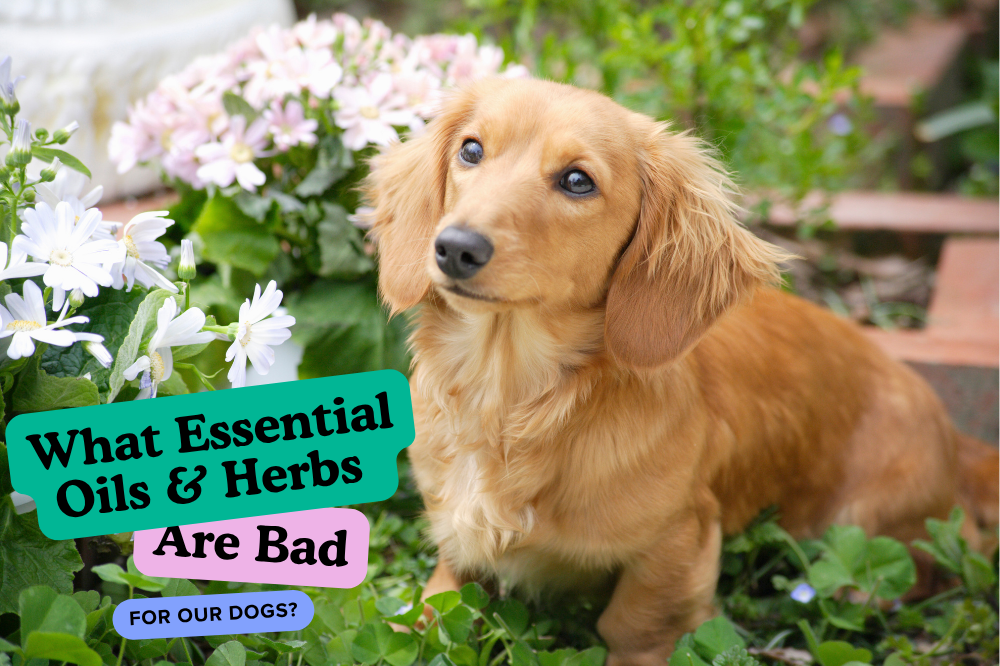
What Essential Oils & Herbs Are Bad for Dogs?
Share
Not Everything Natural Is Pet-Safe — Let’s Clear the Air
I once met someone at the dog park who swore by “lavender and cinnamon water” as her home’s all-purpose spray. She sprayed it on furniture, rugs, even her dog’s crate. When I asked if cinnamon was safe for pets, she said, “It’s just a spice. It’s natural!”
Cue my internal scream.
Because here’s the thing — natural doesn’t always mean safe, especially when it comes to essential oils and herbs. Some of the most aromatic, healing, spa-worthy ingredients in your cabinet can be dangerous — even toxic — to your dog.
So, if you’re someone who loves herbal wellness or DIY cleaning, this guide is for you.
🧪 Let’s Talk Essential Oils First
Essential oils are highly concentrated — we’re talking hundreds of plant compounds condensed into a single drop. Dogs experience these smells way more intensely than we do, and their bodies process these compounds very differently.
Some essential oils are a hard “no” in any form — diffused, applied, or licked off the floor.
❌ Essential Oils That Are Bad for Dogs:
Check ASPCA's official lists on toxic plants for dogs and cats: https://www.aspca.org/pet-care/animal-poison-control/toxic-and-non-toxic-plants
|
Essential Oil |
Why It’s Harmful |
|
Tea Tree (Melaleuca) |
Neurotoxic, can cause tremors, even in tiny amounts |
|
Wintergreen |
Contains methyl salicylate — toxic to liver |
|
Cinnamon |
Irritates mouth and airways; can drop blood sugar |
|
Clove |
Harsh on liver, especially in oil form |
|
Pine |
Can cause skin irritation, GI upset, liver stress |
|
Peppermint |
Overstimulating; causes vomiting in many dogs |
|
Eucalyptus |
Can lead to drooling, breathing issues, lethargy |
|
Citrus oils |
(Lemon, orange, grapefruit) often toxic to liver |
|
Anise |
Known to overstimulate the nervous system |
|
Ylang-Ylang |
Can cause respiratory distress, especially when diffused in confined spaces |
🐶 Quick Tip: If your dog avoids a room where you’re using essential oils, listen to them. That’s not drama — that’s survival instinct.
🌿 Now, Let’s Talk Herbs — Because Not All Garden Greens Are Friendly Either
While we often think of herbs as gentle and healing, some of them can cause serious issues when ingested by dogs — especially in large quantities or in essential oil form.
❌ Herbs and Plants to Be Cautious About:
- Pennyroyal – Traditionally used for fleas, but highly toxic to liver
- Comfrey – Used in healing salves; linked to liver damage in pets
- Oregano – In oil form, can cause vomiting, diarrhea, and even slow heartbeat
- Garlic – Even small amounts can destroy red blood cells over time
- Onion (yes, it’s an herb in some cultures) – Like garlic, toxic to dogs
- Rue – Known to be both phototoxic and a strong GI irritant
- Wormwood – Used in some parasite remedies, but dangerous to the nervous system
- Mugwort – Linked to seizures in sensitive pets
Let’s not forget that many herbs seem harmless until they’re concentrated, as in oils, tinctures, teas, or salves.
🏡 Real-Life Situations to Watch Out For
- Homemade cleaning sprays with vinegar, peppermint, or citrus
- Herbal diffusers that contain eucalyptus, clove, or cinnamon
- Flea repellents using tea tree, pennyroyal, or wormwood
- Scented dog beds, bandanas, or collars soaked in essential oils
- Teas or broths with herbs like garlic or comfrey (yes, some blogs actually recommend this — don’t!)
“I once used a lavender-clove candle during a rainy afternoon. It smelled amazing… until my pug started snorting like a truffle pig. We ended the vibe session early.”
— Emily, Brooklyn dog mom
🩺 What to Do If Your Dog Is Exposed
First of all — don’t panic. If your dog only sniffed or walked past something, chances are they’ll be fine. But if they licked, rolled in, or inhaled a heavy dose of a harmful oil or herb:
- Remove them from the source immediately
- Ventilate the area
- Wipe off any oil from fur using a mild soap and water (never alcohol)
- Call your vet or a pet poison hotline
- ASPCA Poison Control: (888) 426-4435
- Pet Poison Helpline: (855) 764-7661
Bring the label or ingredient list with you — time matters.
✅ Safer Options That Still Smell Great
Looking for safer alternatives to freshen up your home or pamper your pet?
Try these instead:
- Chamomile – calming in small doses
- Frankincense – subtle, grounding, rarely reactive
- Virginian Cedarwood – dry woodsy scent with low risk
- Hydrosols – gentle floral waters with much lower concentrations
- Baking soda + pet-safe herbs like calendula for odor control
You don’t need to give up your love for aromatherapy — you just need to filter it through your dog’s safety.
🐾 Final Words
If you remember one thing from this post, let it be this:
Nature can be both healing and harmful.
Just like you wouldn’t let your dog snack on wild mushrooms or chase a bee, you shouldn't assume all herbs and oils are fair game either. Educate yourself, read labels, and when in doubt — skip it.
Your dog may not care about essential oils, but they care about you. And they trust you to keep them safe.
That trust? Way more precious than any rosemary-scented diffuser.
